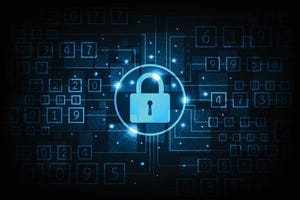What Cybersecurity Memes Reveal About the Industry
Cybersecurity memes do more than entertain — they offer insights into the industry. This article examines five memes from the r/CybersecurityMemes/ subreddit, each highlighting different aspects of the field.
May 31, 2024

Unless you work under the most rigid and un-fun of circumstances, you’ve probably already seen your fair share of IT and cybersecurity memes at the office. These humorous snapshots help us get through the day and serve as inbox fodder for our general entertainment. But have you ever thought about the insights that can be gleaned from them?
Memes, despite some claims that their golden age is over, can provide a glimpse into the stark realities behind many common conundrums we face. They sometimes reveal far more than we’d expect.
In this article, we’ll look at five memes from Reddit's r/CybersecurityMemes/. Each meme goes beyond humor to illuminate the realities of working in IT security.
“Glad to Be of Service”? … or at Risk for Severe Health Problems?
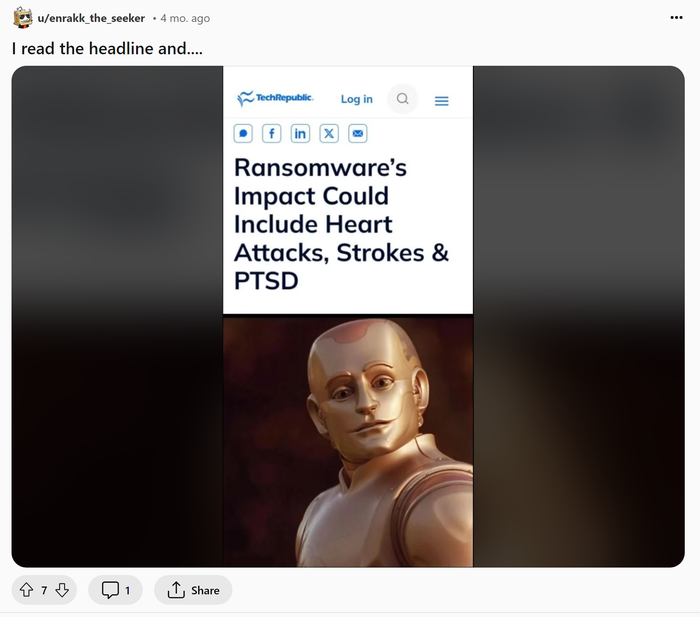
Source: https://www.reddit.com/r/CybersecurityMemes/comments/1afr51e/i_read_the_headline_and/
This meme, posted by enrakk_the_seeker in r/CybersecurityMemes/, features a chilling TechRepublic headline alongside an image of the late comedian Robin Williams dressed as a robot in the 1999 film Bicentennial Man.
The TechRepublic article, based on a report by the UK think tank Royal United Services Institute, identifies several serious health risks as “first-order harms” in ransomware attacks and speaks to the high levels of stress faced by cybersecurity personnel.
The meme cleverly links the headline with Williams’ character, Andrew Martin, a robot who serves humans selflessly. The character’s catchphrase, “One is glad to be of service,” underscores his unwavering commitment. It's a sentiment that would resonate with many cybersecurity professionals. In one scene, Andrew obediently jumps out a window at the whim of a young girl, mirroring how security pros may feel when addressing today’s challenges.
Though Bicentennial Man was largely panned – it boasts a red-hot 37% rating on Rotten Tomatoes today – the movie's impact on audiences endures. For example, a Medium post praises the film’s message of selfless service, calling it “a beautiful love story questioning the age-old paradox of: ‘What is a human being?’”
But this brings us to our own question, perhaps less profound but no less important: Are cybersecurity professionals, much like Andrew, truly “glad to be of service," or are they risking their health due to the immense stress associated with ransomware and other threats on their watch? It's crucial to recognize the human element behind cybersecurity and ensure that those protecting our virtual spaces are also protected from burnout and undue stress.
Sales Pitch Fatigue

Source: https://www.reddit.com/r/CybersecurityMemes/comments/18iyd29/fooooorevvvvver/
You know that feeling when yet another sales rep slides into your LinkedIn DMs? Yeah, one of those guys from any number of security solution vendors or retailers who wants to “connect.” They all have that suspicious smirk and seem like they were minted in a factory somewhere, endlessly churning out the same old lines.
Let’s face it: Constantly being sold to is fatiguing, annoying, and sometimes even feels stalker-y. Every new message drones on about the latest must-have solution to keep your network safe, but after the nth identical pitch, it can be pretty hard to take them seriously.
This meme, posted by Shields0001 in r/CybersecurityMemes/, captures this persistent irritation perfectly. The humor, of course, lies in the endless stream of vacuous sales messages, which too often end in an unwarranted and unwanted meeting request. It’s a shared experience among cybersecurity professionals, and a universal annoyance.
However, there's a deeper layer here. The constant barrage isn't just irksome; it reflects a broad issue in the industry. Sales tactics that prioritize volume over value not only waste our time, but they can also diminish the credibility of genuinely useful products.
Ultimately, this meme isn't just about the annoyance of being sold to — it's a commentary on the need for more respectful, targeted approaches in the cybersecurity sales process. Until that happens, the memes will keep rolling in, offering a bit of humor amid the marketing noise and our overflowing inboxes full of pitches and appeals.
A Drastic Approach to Cyber Defense
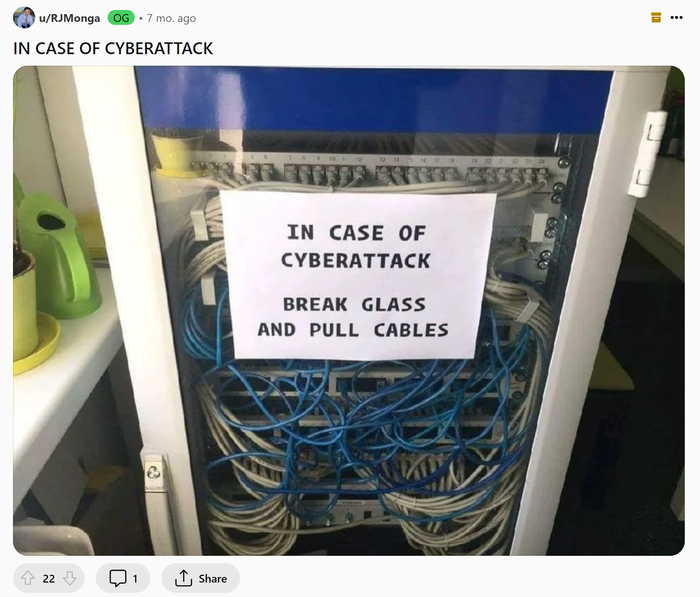
Source: https://www.reddit.com/r/CybersecurityMemes/comments/16aimcv/in_case_of_cyberattack/
This image, posted by RJMonga, conveys the sense of fatalism that sometimes pervades the cybersecurity industry. The suggestion to break the glass and physically disconnect networking cables during a cyberattack is both a humorous exaggeration and a nod to the extreme measures occasionally considered in the face of relentless cyber threats.
Cybersecurity professionals often contend with complex and sophisticated attacks that require equally sophisticated defenses. The meme suggests that in moments of sheer desperation, even the most cutting-edge systems might need a blunter approach — simply pulling the plug on it all.
However, while physically disconnecting devices from affected or infected networks is certainly a low-tech method to halt the spread of a cyberattack, in almost all cases, it would be very unwise to do so.
So, the next time you’re tempted to resort to such drastic measures, remember to give the steps and procedures outlined in your organization’s business continuity and disaster recovery plan a shot. After all, it’s probably the right thing to do.
AoT: The Annoyance of Things
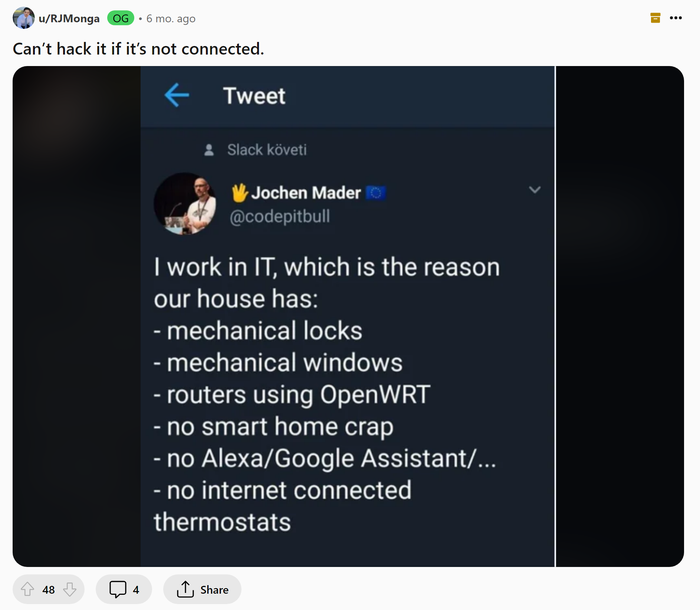
Source: https://www.reddit.com/r/CybersecurityMemes/comments/180emhf/cant_hack_it_if_its_not_connected/
This tweet by Jochen Mader, @codepitbull on X, posted by RJMonga in r/CybersecurityMemes/, has many of the characteristics one might expect from a German IT professional who displays both the Vulcan salute and the EU flag in his display name. Like the Vulcans, he values logic and reason, and like Europe, he values strict data privacy laws and all the other perks and protections of GDPR.
Jochen’s tweet reflects a growing sentiment among IT professionals who are a bit skeptical of the proliferation of IoT devices and smart home technologies. His cautious and practical approach to home technology is rooted in a deep understanding of the potential cyber vulnerabilities at hand.
High-profile failures of IoT and other smart devices have only reinforced the concerns featured in the tweet. For instance, incidents of Tesla owners being locked in their cars due to software issues or dead batteries have not instilled confidence in these skeptics and show the rest of us the potential pitfalls of automated systems.
Jochen's preference for mechanical locks and windows, and his avoidance of smart home devices like Alexa or Google Assistant, represents a rather practical, if unsexy, low-tech approach to risk mitigation at home. By favoring time-tested mechanical ( “dumb”) solutions, Jochen reduces the potential for data privacy compromises, hacking, and technical malfunctions.
This traditionalist approach prioritizes reliability and security over the convenience offered by smart devices. While many of us may not share the same concerns, Jochen’s view highlights a kind of caution that’s often missing in our digital age.
The Unglamorous Reality of Security Breaches
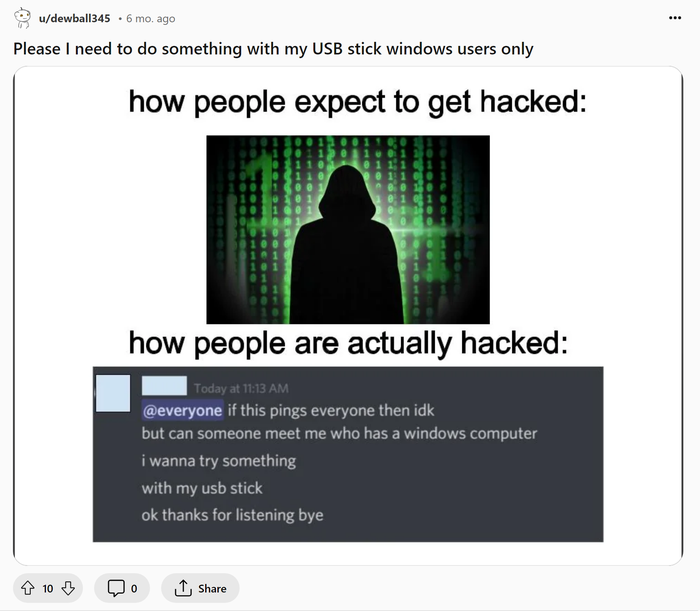
Source: https://www.reddit.com/r/CybersecurityMemes/comments/186hey0/please_i_need_to_do_something_with_my_usb_stick/
This meme, posted by dewball345, displays the difference between popular misconceptions of hacking and the mundane reality of how security breaches actually happen.
Contrary to “Hollywood-ified” portrayals, real-life cybersecurity threats typically rely on simple, unglamorous methods. Hacking often involves social engineering, human error, and a variety of less-than-thrilling technical exploits.
While professionals in the field understand this, it’s a challenging concept to convey to those less familiar with cybersecurity. When people finally grasp the reality, it might make them less inclined to invest in proper cybersecurity measures because the threats don’t seem as dramatic.
Although the meme might not offer anything we didn’t already know, it serves as an important reminder: These common, everyday methods are alarmingly effective because they exploit the human tendency to trust others. The next attacker is more likely to look more like that annoying sales rep clogging up your inbox than the shadowy, cloaked figure in front of a wall of binary code.
Whether it’s insider threats or an intruder faking credentials, the key takeaway is to face reality. It’s important to get nontechnical decision-makers to support robust cybersecurity systems, practices, and protocols, regardless of how exciting or mundane the potential threats may seem.
About the Author(s)
You May Also Like

